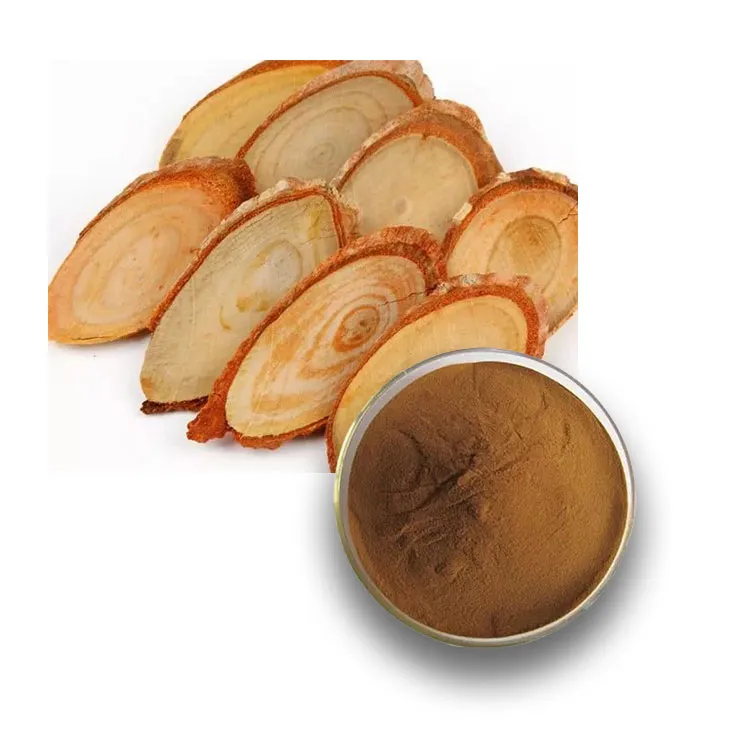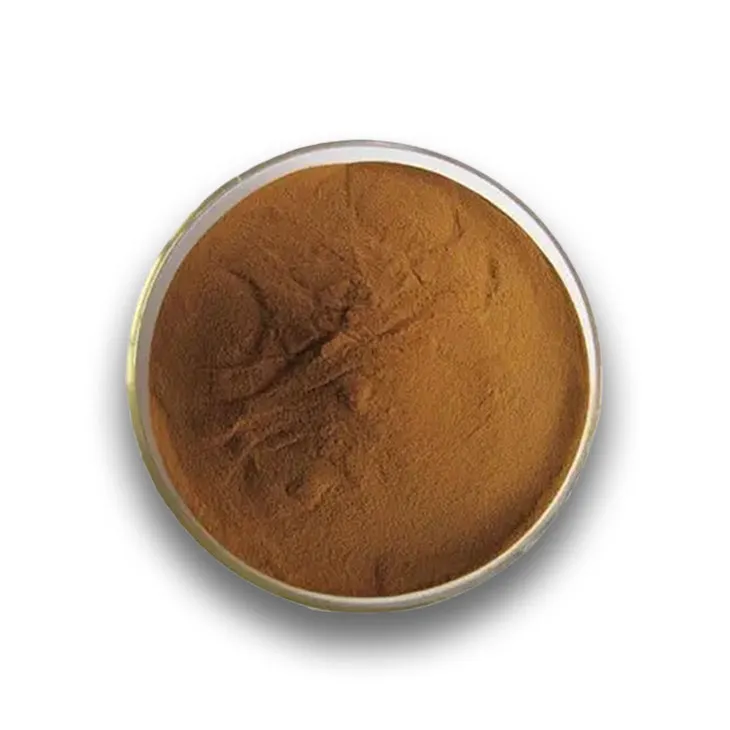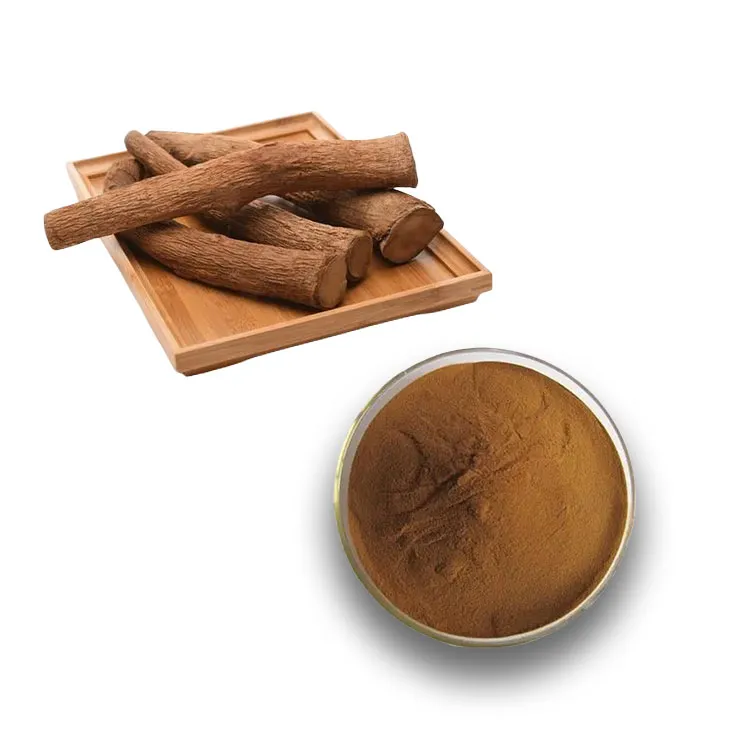- 0086-571-85302990
- sales@greenskybio.com
The Optimal Bioavailability of Tongkat Ali Extract Powder.
2024-11-28

1. Introduction
Tongkat Ali, scientifically known as Eurycoma longifolia, has been used for centuries in traditional medicine in Southeast Asia. The extract powder of Tongkat Ali is gaining increasing popularity as a natural supplement due to its potential health benefits, which include enhancing male virility, increasing energy levels, and improving overall well - being. However, the bioavailability of Tongkat Ali Extract powder is a crucial factor that determines its effectiveness in the body. Bioavailability refers to the proportion of a substance that enters the circulation and is able to have an active effect. Understanding and optimizing the bioavailability of Tongkat Ali Extract powder is essential for maximizing its potential benefits.

2. Modern Extraction Techniques and Bioavailability
2.1 Supercritical Fluid Extraction
Supercritical fluid extraction (SFE) is one of the modern extraction techniques that has shown great promise in enhancing the bioavailability of Tongkat Ali Extract powder. Supercritical fluids possess properties between those of a liquid and a gas, which makes them excellent solvents for extracting bioactive compounds from plant materials. In the case of Tongkat Ali, carbon dioxide (CO₂) is often used as the supercritical fluid.
The advantages of SFE for Tongkat Ali extraction are numerous. Firstly, it is a relatively gentle extraction method compared to traditional solvent - based extractions. This means that it can preserve the integrity of the bioactive compounds in Tongkat Ali, such as quassinoids and alkaloids, which are important for its health - promoting effects. Secondly, SFE can produce a more pure extract with fewer impurities. The absence of harmful solvents in the final product also makes it safer for consumption.
Regarding bioavailability, the purity and intactness of the bioactive compounds obtained through SFE contribute to better absorption in the body. When these compounds are in their pure and un - degraded form, they are more likely to be recognized and taken up by the cells in the digestive tract. For example, the quassinoids extracted by SFE may have a higher chance of passing through the intestinal membrane and entering the bloodstream compared to those extracted by harsher methods.
2.2 Comparison with Traditional Extraction Methods
Traditional extraction methods, such as maceration and Soxhlet extraction, often use organic solvents like ethanol or methanol. While these methods can also extract bioactive compounds from Tongkat Ali, they have some drawbacks in terms of bioavailability. Maceration may take a long time, and during this process, some of the bioactive compounds may degrade or react with the solvent, reducing their effectiveness. Soxhlet extraction, although more efficient in terms of extraction yield, may also introduce more impurities and may cause some thermal degradation of the compounds.
In contrast, SFE - derived Tongkat Ali Extract Powder has a higher quality in terms of bioactive compound content and purity. This leads to potentially better bioavailability as the body can more easily utilize the beneficial compounds without having to deal with a large amount of impurities or degraded substances.

3. Role of Additives in Bioavailability
3.1 Solubilizing Agents
Tongkat Ali Extract Powder may have poor solubility in water, which can limit its bioavailability. Solubilizing agents can be added to improve its solubility. For example, certain surfactants can be used to break up the extract powder into smaller particles and increase its dispersion in aqueous solutions. This allows for better contact between the extract and the digestive juices in the gastrointestinal tract, facilitating absorption.
One common solubilizing agent is polysorbate 80. When added to Tongkat Ali Extract Powder, it can form micelles around the hydrophobic components of the extract, making them more water - soluble. This not only improves the solubility but also enhances the bioavailability as the solubilized compounds are more likely to be absorbed by the intestinal cells.
3.2 Absorption Enhancers
Absorption enhancers are another type of additives that can play a significant role in improving the bioavailability of Tongkat Ali extract powder. Some natural compounds, such as piperine (found in black pepper), have been shown to enhance the absorption of other substances. Piperine can inhibit certain enzymes in the gut that are responsible for metabolizing drugs and other bioactive compounds, thereby increasing the amount of Tongkat Ali extract that is available for absorption.
Another example is the use of phospholipids as absorption enhancers. Phospholipids can interact with the cell membranes in the intestine, increasing their permeability. This allows the Tongkat Ali extract powder components to more easily pass through the intestinal barrier and enter the bloodstream, thus improving bioavailability.

4. Encapsulation Methods and Bioavailability
4.1 Liposomal Encapsulation
Liposomal encapsulation is an advanced technique that can significantly enhance the bioavailability of Tongkat Ali extract powder. Liposomes are spherical vesicles composed of phospholipid bilayers. They can encapsulate the Tongkat Ali extract within their core or within the lipid bilayer.
The advantages of liposomal encapsulation for bioavailability are multiple. Firstly, liposomes can protect the extract from degradation in the gastrointestinal tract. The lipid bilayer acts as a barrier against the harsh acidic environment of the stomach and the enzymatic activity in the gut. Secondly, liposomes can target the delivery of the extract to specific cells or tissues. This is because they can be designed to interact with specific cell surface receptors, ensuring that the Tongkat Ali extract is delivered to the cells where it can have the most beneficial effect.
For example, liposomes can be engineered to target the cells in the liver or the male reproductive organs, depending on the intended health benefits of the Tongkat Ali extract. This targeted delivery not only improves bioavailability but also reduces the potential side effects as the extract is more precisely directed to the relevant tissues.
4.2 Microencapsulation
Microencapsulation is another encapsulation method that can be used for Tongkat Ali extract powder. In microencapsulation, the extract is encapsulated within a polymeric matrix. This can protect the extract from environmental factors such as light, air, and moisture, which can cause degradation.
Regarding bioavailability, microencapsulation can also control the release of the extract in the gastrointestinal tract. For example, some microencapsulated formulations can be designed to release the Tongkat Ali extract in a slow and sustained manner. This allows for a more continuous absorption of the extract in the intestine, rather than a sudden burst of absorption which may overload the absorptive capacity of the cells. Slow - release microencapsulated Tongkat Ali extract powder may thus have improved bioavailability compared to non - encapsulated forms.
5. Factors Affecting Bioavailability in the Body
5.1 Digestive System Physiology
The physiology of the digestive system plays a crucial role in the bioavailability of Tongkat Ali extract powder. The pH levels in different parts of the digestive tract, for example, can affect the solubility and stability of the extract. In the stomach, the highly acidic environment may cause some of the bioactive compounds in the Tongkat Ali extract to become protonated, which can change their solubility properties. If they become less soluble, their absorption may be hampered.
The presence of digestive enzymes also affects bioavailability. Some enzymes may break down the bioactive compounds in the Tongkat Ali extract into smaller, less active metabolites. For example, certain glycosidases may cleave the sugar moieties attached to the quassinoids in Tongkat Ali, potentially reducing their bioactivity. Understanding these enzymatic reactions can help in formulating strategies to protect the bioactive compounds during digestion, such as through encapsulation or the use of enzyme inhibitors.
5.2 Individual Variations
Individual variations can also have a significant impact on the bioavailability of Tongkat Ali extract powder. Factors such as age, gender, and overall health status can influence how the body absorbs and utilizes the extract. For example, older individuals may have a reduced digestive function, which can lead to lower bioavailability of the Tongkat Ali extract. Gender differences may also play a role, as hormonal differences between males and females can affect the metabolism and absorption of bioactive compounds.
Moreover, individuals with certain pre - existing health conditions, such as liver or kidney diseases, may have altered drug - metabolizing enzymes or impaired excretion mechanisms. This can affect the bioavailability and clearance of Tongkat Ali extract powder in the body. Therefore, it is important to consider these individual factors when studying and optimizing the bioavailability of Tongkat Ali extract powder.
6. Conclusion
In conclusion, the bioavailability of Tongkat Ali extract powder is a complex and multi - faceted topic. Modern extraction techniques such as supercritical fluid extraction can enhance the quality and purity of the extract, which is beneficial for bioavailability. Additives like solubilizing agents and absorption enhancers can further improve the absorption of the extract in the body. Encapsulation methods, including liposomal and microencapsulation, offer protection and targeted or controlled release of the extract, also contributing to optimal bioavailability.
However, it is also important to consider the factors affecting bioavailability within the body, such as digestive system physiology and individual variations. By understanding these various aspects, researchers and supplement manufacturers can develop more effective Tongkat Ali extract powder products that can deliver the maximum potential health benefits to consumers.
FAQ:
1. What is Tongkat Ali extract powder?
Tongkat Ali extract powder is a product derived from the Tongkat Ali plant. It contains various bioactive compounds that are believed to have potential health benefits, such as enhancing male vitality, improving energy levels, and potentially having anabolic effects.
2. Why is bioavailability important for Tongkat Ali extract powder?
Bioavailability is crucial because it determines how much of the active compounds in the Tongkat Ali extract powder can be absorbed and utilized by the body. High bioavailability ensures that the supplement can effectively exert its intended physiological effects.
3. How does supercritical fluid extraction enhance the bioavailability of Tongkat Ali extract powder?
Supercritical fluid extraction can enhance bioavailability in several ways. It can selectively extract the desired bioactive compounds while leaving behind unwanted substances. This results in a more concentrated and pure extract. Also, it can produce smaller particle sizes or a more soluble form of the extract, which can be more easily absorbed by the body.
4. What are the common additives used to improve the bioavailability of Tongkat Ali extract powder?
Some common additives may include substances like piperine. Piperine has been shown to enhance the absorption of other compounds by inhibiting certain enzymes in the gut that are involved in drug metabolism. Other additives may be designed to improve solubility or protect the active compounds during digestion.
5. How does encapsulation improve the absorption of Tongkat Ali extract powder?
Encapsulation can protect the Tongkat Ali extract powder from degradation in the stomach's acidic environment. It can also control the release of the active compounds, allowing for a more sustained and targeted absorption in the intestines, where the majority of nutrient absorption occurs.
Related literature
- Bioavailability of Herbal Extracts: The Case of Tongkat Ali"
- "Enhancing Bioactive Compound Absorption from Tongkat Ali through Modern Extraction and Delivery Technologies"
- "The Role of Encapsulation in Improving the Bioavailability of Natural Extracts: Focus on Tongkat Ali"
- ▶ Hesperidin
- ▶ citrus bioflavonoids
- ▶ plant extract
- ▶ lycopene
- ▶ Diosmin
- ▶ Grape seed extract
- ▶ Sea buckthorn Juice Powder
- ▶ Beetroot powder
- ▶ Hops Extract
- ▶ Artichoke Extract
- ▶ Reishi mushroom extract
- ▶ Astaxanthin
- ▶ Green Tea Extract
- ▶ Curcumin Extract
- ▶ Horse Chestnut Extract
- ▶ Other Problems
- ▶ Boswellia Serrata Extract
- ▶ Resveratrol Extract
- ▶ Marigold Extract
- ▶ Grape Leaf Extract
- ▶ blog3
- ▶ blog4
-
High - quality Chasteberry Extract Products.
2024-11-28
-
China's banana juice powder suppliers.
2024-11-28
-
Bulk purchase of cranberry extract.
2024-11-28
-
How to make powder with bayberry extract?
2024-11-28
-
The best peony root extract in nature.
2024-11-28
-
100% Pure Organic Baicalin.
2024-11-28
-
Mulberry Extract
2024-11-28
-
Horse Chestnut Extract
2024-11-28
-
Plantain extract
2024-11-28
-
Sugarcane Extract
2024-11-28
-
Phyllanthus Emblica Extract
2024-11-28
-
Saw Palmetto Extract
2024-11-28
-
Shikonin
2024-11-28
-
Berberis aristata Extract
2024-11-28
-
Bayberry Extract
2024-11-28
-
Hawthorn Extract
2024-11-28





















